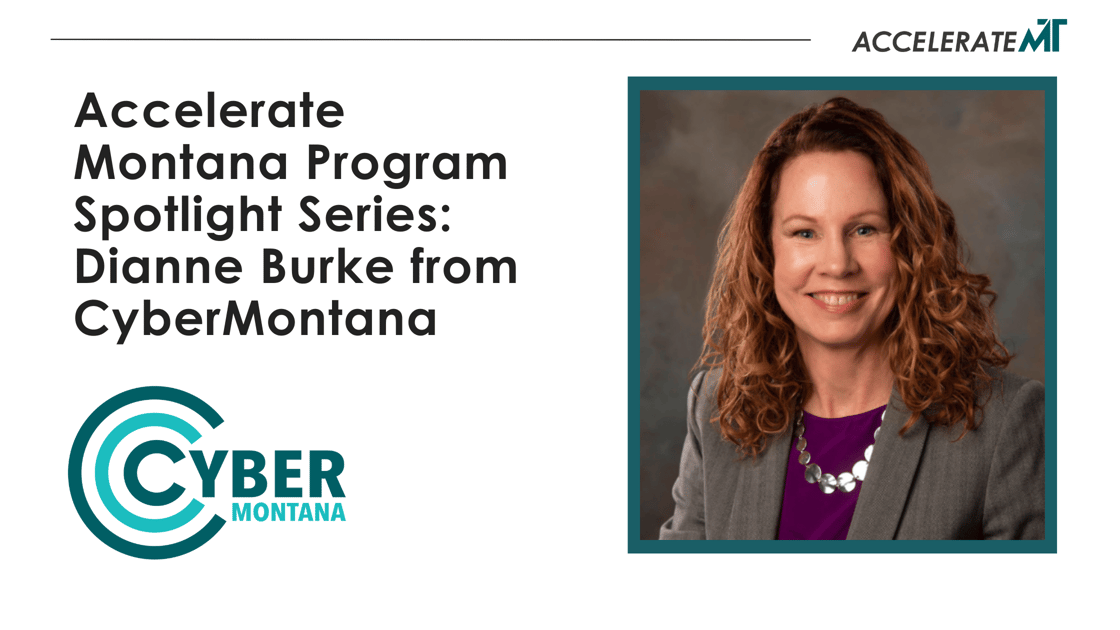AccelerateMT Program Spotlight Series: Dianne Burke
August 9, 2022 •Accelerate Montana Team

Welcome to the first post in AccelerateMT’s Program Spotlight Series. In this series of blog posts, you will meet the incredible leaders from across our programs and learn more about each program within AccelerateMT.
In this post, we are getting to know Dianne Burke, the Director of CyberMontana, a statewide initiative providing cybersecurity awareness, training, and workforce development for businesses and residents of Montana of all ages and levels of experience.
This interview has been edited lightly for clarity.
Dianne Burke is a cybersecurity faculty member at Missoula College University of Montana and serves as Director of CyberMontana. She has taught networking, security, data operations, and computer forensics courses in both the public and private sectors She recently completed a career as a forensic analyst where she specialized in ESI (Enterprise Security Intelligence) collection and analysis and assisted counsel in cases across the U.S. Ms. Burke holds a B. A. from Rice University, an M.S. from the University of Houston, an M. Ed. from the University of Montana, and is a doctoral student at the University of Montana.
Tell us your story. How did you get started with cybersecurity?
“There were no cyber security or computer science programs when I started college. So, I started coding personally then went to college and got a Bachelor's Degree in Biochemistry and then a Master's Degree in Chemistry. I'm one of these people who still had a technical job as a chemist while finishing my Master's Degree and then shifted into something else - namely cybersecurity. There are a lot of parallels, I would say, between chemistry and computers though.”
“Eventually I transitioned into programming, network management, computer forensics, and teaching. When I transitioned into cybersecurity and computer science, one of the hardest things that I had to deal with was being a female in this industry. I used to really have to advocate for myself. Thankfully, now I’m at the point in my career where my attitude is, go ahead and underestimate me.”
What is it about the cybersecurity industry in particular that interests you?
“The bottom line is that cyber security is like doing puzzles all day long. You see something that occurs, and you try to figure out not only ‘how did that occur?’, but then what did these folks do during this intrusion? Which way did they go? You're following threads and trying to see what people do. You're trying to anticipate what else they may have done. I'm playing with the puzzle all day long, and that, to me, that's just a whole lot of fun.”
What are you most passionate about when it comes to cybersecurity and the goals of CyberMontana?
“We offer education for people from sixth grade all the way up. I am excited about all of our programs because they all go toward the ultimate goal of increasing our defensive posture in the state and nationally by building cybersecurity knowledge. Working with those who are non-technical and teaching them cybersecurity best practices is one of the most important things we do as a society. The whole idea of cyber hygiene is vitally important.”
What do you think is the most important thing about CyberMontana?
“The most important thing is that we have statewide outreach. We are reaching out to every high school in the state and to small businesses across the state. We are reaching small communities. I'm just so enthusiastic about the reach that we have with the array of programs that we're putting together”.
If you have one dream for the future of CyberMontana and the cyber security field, what would it be?
“You know, when you meet people, they usually ask, ‘Well, what do you do for a living?’ When I say that I teach cybersecurity I just get these blank looks because so many people don't even know what that means. It would be great for people to be conversant about cybersecurity.”
“Wherever they are (in their awareness), whether it's technical or non-technical, (cybersecurity) should be as ubiquitous as the knowledge of how to drive a car or understanding traffic laws. You know, we all go to a four-way stop and we figure out who gets to go next. And everybody has a concept of how that works. It would be great if people had basic cybersecurity knowledge that was widely disseminated.”
Is there anything else that you want these people to know? Do you have one final takeaway?
“We see that so many aspects of education across all grade levels use computers. So many things that we do today are computer-based. That's a paradigm shift for many people, but we have to embrace the fact that computers are an integral part of our lives and are a tool in so many ways.”
“The majority of people want to use computers in a productive, responsible way, but there are always going to be people who take that tool and use it in a malicious manner. There used to be a safe driving ad campaign years ago that said, “Watch out for the other guy.” It wasn't so much about you being careful. It's more about being vigilant when you're driving, because you don't know what somebody else is gonna do”
“And that's really the attitude that we need to take: “Watch out for the other guy,” because people are knocking on your metaphorical door to get into your network. Behaving in a protective way is going to become second nature as we accept this new reality, but it's not there right now. People don't understand really how pervasive that connection is, and I think it is a societal step that we need to take so that we can have our best cybersecurity defensive posture.”
“So many of us think that we still live in an analog world. But we're swimming in a digital ocean and too many of us don’t know how to swim.”
Get Updates
Featured Articles
Categories
- Career Resources (5)
- Case Studies (8)
- CDL Program (1)
- CyberMontana (3)
- Employer Resources (2)
- Film and Media (3)
- Healthcare Careers (1)
- Job Site Ready Program (5)
- Line work (1)
- Native Women Launch (1)
- Plumbing (1)
- Rapid Training Program (18)
- Start Your Cyber Career (1)
- Toolkits (2)
- Workforce Development (1)



